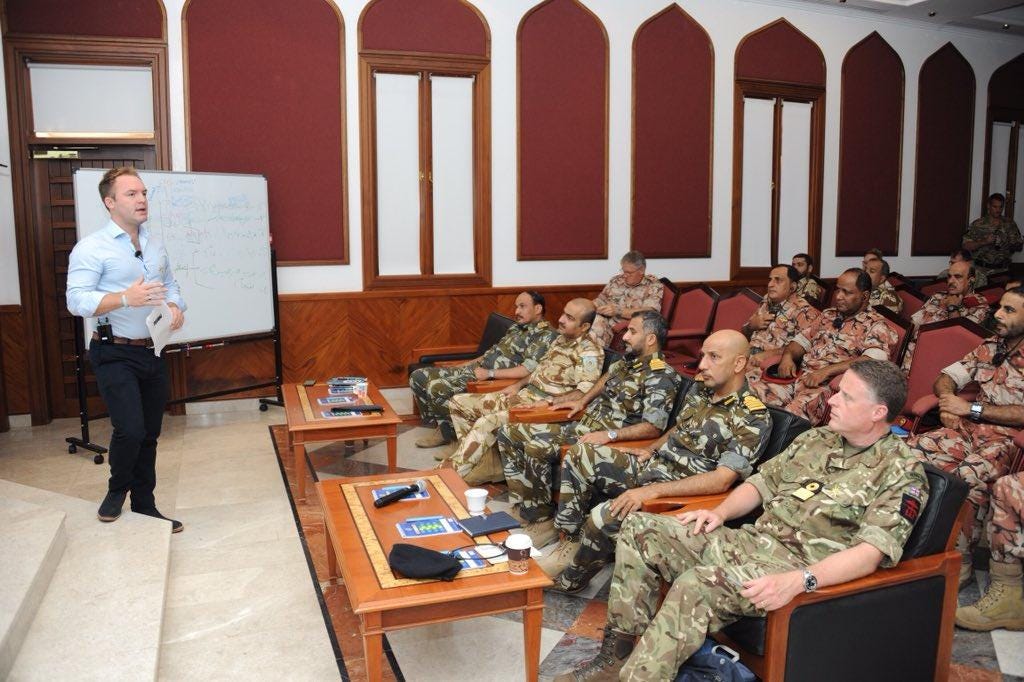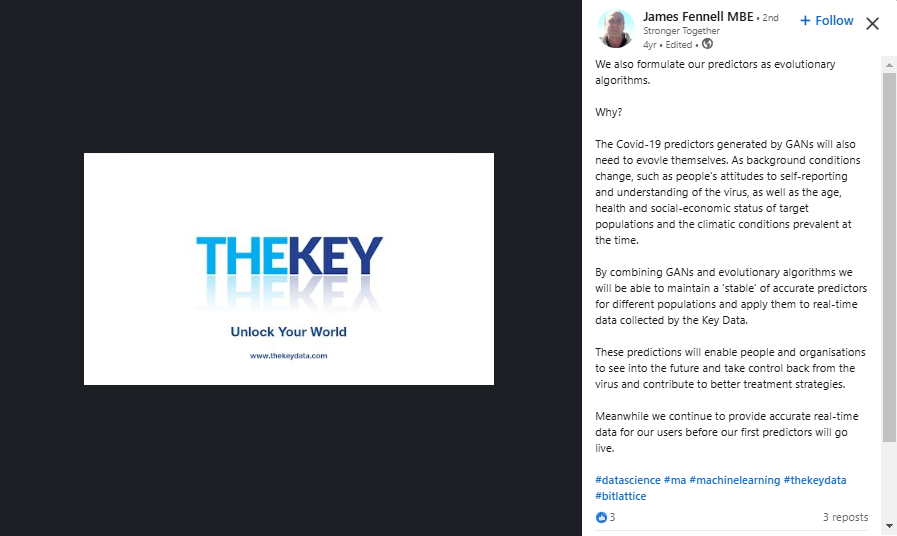Information is THE most powerful weapon in the 21st century.
Corporations and non-governmental organisations are appearing to fight against misinformation but their actions suggest they are doing quite the opposite, as this article will seek to demonstrate.
The UK’s Project Alchemy stands as an intimidating, covert initiative designed to influence global narratives and counter adversarial propaganda. Launched by the UK Ministry of Defence (MoD), Project Alchemy seeks to shift the global balance of power by controlling the flow of information. Its development and implementation, particularly through Valent Projects, offers a look inside the new age of warfare, where operation Gladio style manipulation of public perception is as vital as military might.
The Alchemists
The team dubbed as ‘The Alchemists’ played critical roles in the development and execution of Project Alchemy:
Lieutenant General Sir Charles Richard Stickland - creator of Project Alchemy.
Brigadier Simon Scott - decorated war veteran. Military lead for Project Alchemy.
Dom J Morris - Chief of Project Alchemy. Friend to Boris Johnson. Visiting Research Fellow - Centre for Grand Strategy, KCL. Conservative County Councillor - Fairford, Lechlade & the Villages.
Amil Khan – As the leader of Valent Projects, Khan brought invaluable experience to the project, particularly in online media manipulation and counter-propaganda efforts. His work was integral in shaping the project’s strategic direction, especially in terms of shaping narratives and using digital tools to sway public opinion. Khan’s involvement in targeting media outlets like The Grayzone highlights his commitment to managing the narrative and suppressing dissent.
Augustus Lersten worked with Amil Khan at Aktis strategies and now is the CEO and founder of Labrys that produces a workforce management platform.
Major General Alex Turner – From 2020 to 2022, Turner was the head of the 77th Brigade, a unit that specializes in psychological and cyber operations. Under his leadership, the brigade became instrumental in supporting Project Alchemy’s information warfare objectives. Turner’s experience in military operations combined with a deep understanding of information warfare gave him the tools necessary to lead covert operations targeting Russia, Ukraine, and other geopolitical flashpoints.
James Fennell - worked as a director at CHEMONICS, one of the largest recipients of USAID cash into Ukraine, creator of a predictive (Minority Report) AI called Evogan which incidentally is also the name of a Chinese evolutionary computation assisted GAN and Corona-help.co.uk an application which gathered data about COVID19 infections along with Key2.0 a complete biosecurity monitoring tool (Covid Passport). James is the co-founder of Bitlattice a Web3 application designed to facilitate more efficient financial transactions (social credit system) and replace Bitcoin. James helped create the grand strategy document as part of the attempts by Project Alchemy to extend the Ukraine War.
Johnathan Boff - Professor of Military History and War Studies expert at Birmingham University.
Chris Donnelly - A deep politician making important clandestine decisions for the UK government. Obsessed with the Russian threat and still stuck in a cold war mindset. Based at the Institute for Statecraft. Notice in the video below he suggests that there are groups of NGO’s ready to fight against against disinformation and malign influence.
Major Hugh Ward - REVOLUTIONZ - Enabling people within organisations to consistently deliver and improve the right solutions across the spectrum of safety - security - defence.
Aamir Gilani - Governance Specialist-Governance & Policy Program (The World Bank) GRSU/FATA Secretariat. Ex USAID employee.
Captain Ben Smith - Senior consultant and marine planning at GoBe environmental consultants.
Alex Sawyer is Priti Patel’s husband and works as a marketing consultant for the American financial company Nasdaq and as a Conservative local councillor.
Frank Ledwidge - Senior Lecturer in War Studies at Portsmouth University.
Dr Rob Johnson - Senior Research Fellow, Changing Character of War.
Becky Austin MCIM - Campaign Change management. X Gov Results.
Matthew Waterfield - Recovery and Planning expert. Previously worked for the United Nations and for Aktis Strategy with Amil Khan.
Ariadne AI Development Team – The creation of Ariadne AI, led by an undisclosed team of experts, was a significant technological achievement in the realm of information warfare. By using machine learning and natural language processing, Ariadne AI gave Valent Projects an unparalleled ability to manipulate the global flow of information.
An army of NGO’s and partnerships across the world such as Alliance4Europe with their social media intelligence unit and the CTI-League a self styled justice league of disinformation who carry out influence operations.
2020
The seeds for Project Alchemy were sown in 2020, at a time when the UK was grappling with the increasing influence of Russian state-backed media outlets such as RT and Sputnik. These media platforms were not just spreading supposed disinformation; they were shaping public opinion and challenging the global narrative. The UK recognized the growing threat posed by such media campaigns, particularly in the context of global conflicts and geopolitical tensions.
At the heart of the initiative was the need for a coordinated strategy to counter these threats. Project Alchemy would harness a range of tools and relationships, including cyber operations, psychological warfare, media manipulation, and more, to ensure that the UK and its allies could protect their interests and shape the narrative in their favour.
2021
By 2021, Project Alchemy’s framework began to take shape. The UK government formalized its strategy to counter Russian disinformation, focusing on disrupting media outlets and online platforms.
Key to the project’s development was Amil Khan, a prominent figure with a career in psychological operations. Khan had previously founded Valent Projects, a company specializing in countering disinformation and media manipulation. His expertise in online influence and media strategy made him a natural choice for leading some of the project’s most critical operations.
Throughout 2021, the UK Ministry of Defence and Khan’s team worked together to refine the project’s approach. The first major objective was clear: disrupt Russian media outlets and reduce their ability to control narratives about the war in Ukraine, the EU, and NATO.
Prince Harry called upon Valent and Alchemy to produce a bot army called the Sussex squad who appeared to be attempting to control the sentiment surrounding Harry and Meghan. He has acknowledged their help and fundraising for Sentebale one of his charities in Africa many times. Sentebale was funded heavily by USAID.
The Invasion of Ukraine: 2022 Full Launch of Project Alchemy
The year 2022 marked a turning point in global politics with Russia’s invasion of Ukraine. This pivotal moment was the catalyst that fully activated Project Alchemy, expanding its scope from a strategic media manipulation initiative to a comprehensive information warfare campaign.
On February 24, 2022, Russia's invasion ignited an immediate and intense global response. The UK government recognized the urgency of its role in countering Russian influence, both within Europe and globally. Project Alchemy swiftly morphed into a full-scale, multifaceted operation aimed at supporting Ukraine while simultaneously confronting Russia’s narrative on the world stage. Other narratives would also be challenged by Project Alchemy.
Offensive Information Operations
One of Project Alchemy’s first moves was to pressure social media giants and platforms to restrict the reach of Russian outlets like RT and Sputnik. This resulted in the banning of Russian news outlets in the UK and in many countries across Europe. The project also sought to undermine the influence of independent media outlets that were perceived as sympathetic to Russian interests, including through legal harassment and covert tactics. The CCDH also got involved targeting individuals whose social media reach was becoming a threat.
Covert Military Operations
Although initially focused on information warfare, Project Alchemy also extended its operations into the physical realm. With support from the 77th Brigade, a British Army unit that specializes in psychological operations and information warfare, covert operations were carried out in both the cyber and military domains. These covert operations were inspired by operation Gladio and included everything from disrupting Russian military communications to sabotaging infrastructure in areas of critical importance to the Kremlin. Operatives were trained by MI6.
Strategic Public Opinion Management
As the war dragged on, it became clear that sustaining public support for the conflict in Ukraine, especially in the UK, would require a well-coordinated narrative. Several large NGO’s were partnered with to push the objective of extending the conflict between Russia and Ukraine. Project Alchemy also aimed to prepare the British public for the potential economic fallout of the conflict, such as rising fuel prices, food shortages, and general austerity. This was necessary to maintain public backing for the government’s hard line stance on Russia and Ukraine.
Targeting UK Citizens and Journalists: Controversial Tactics
While Project Alchemy was primarily focused on disrupting foreign disinformation via a network of NGO’s, it formed a useful connection with the CCDH as I mentioned previously that targeted UK and USA based citizens and journalists.
1. Targeting Independent Media Outlets
Project Alchemy discredited and silenced independent media outlets that were seen as sympathetic to Russian interests. This included both media inside the UK and outside, but with a significant focus on global platforms that could influence the British public.
A prime example of this was The Grayzone, an independent media outlet critical of UK foreign policy, especially regarding the conflict in Ukraine and the UK's support for NATO. Amil Khan, through Valent Projects, was reportedly involved in efforts to undermine the credibility of outlets like The Grayzone, which were seen as challenging the government’s narrative.
Independent journalists and media outlets critical of UK policy or sympathetic to Russia’s perspectives became targets of legal and other forms of pressure. The intent was to suppress voices that might undermine the official government narrative on the war in Ukraine or other geopolitical issues.
Legal harassment tactics were reportedly used to intimidate or discourage journalists from publishing stories that countered the government’s stance. This might have involved litigation threats or attempts to suppress critical voices through regulatory actions.
2. Psychological Operations on UK Citizens
Project Alchemy also aimed to shape public opinion within the UK, preparing citizens for the long-term consequences of the Ukraine conflict, which could include higher costs of living and increased economic instability.
Media manipulation campaigns sought to prepare the British public for potential sacrifices like economic hardship in support of Ukraine. This involved targeted messaging that could either bolster support for the government’s stance or quell dissent.
The goal was to ensure that the public remained supportive of the UK’s involvement in the conflict, even as the economic costs began to mount.
3. Online Disinformation and Social Media Campaigns
Social media platforms became a battlefield in the war of information, with efforts to control or influence narratives, both domestically and internationally. In some instances, this involved pushing pro-government narratives on platforms popular among the British public, and countering narratives that diverged from the official UK position.
Psychological operations (psyops) could target UK citizens directly, using social media and digital platforms to sway public opinion or create confusion. This was a terrifying aspect of Project Alchemy exploits resulting in all sorts of social media chaos. Bot groups such as the Mutton Crew (anti-vaxxers), Gnasherjew (weaponised antisemitism) and NAFO (Ukraine) were utilised here and operatives were deployed to focus on these areas.
4. Disrupting Media Access to Information
Reports suggest that Project Alchemy used various tools to limit or disrupt the flow of information to certain media outlets that were perceived as hostile or critical of the government’s agenda. For example, journalists investigating or reporting on government operations may have faced greater obstacles accessing public information or encountered surveillance.
Dealing with Anti-Vaxxers: Managing the Pandemic Narrative
Project Alchemy didn’t limit its scope to external disinformation campaigns; it also addressed internal challenges, particularly during the COVID-19 pandemic. One of the more difficult narratives to control was the rise of anti-vaccination sentiments, which gained significant traction in online spaces and threatened to undermine public health efforts in the UK and beyond.
1. Targeting Anti-Vaccine Propaganda
The anti-vaccine movement posed a direct threat to the UK government’s public health goals, especially as vaccination programs rolled out to combat the COVID-19 pandemic. Misinformation about the safety and efficacy of vaccines spread rapidly across social media, with anti-vaxxer groups gaining significant attention and followers.
In response, Project Alchemy and its partner networks launched a series of information operations utilising operative groups nicknamed, “the Mutton crew”, to combat anti-vaccine content. This involved:
Debunking misinformation: Coordinating with health experts and scientists, the project disseminated counter-narratives and what they determined to be ‘factual’ information to dismantle anti-vaccine claims, using often misinterpreted ‘official’ health resources to enhance credibility.
Influencing social media platforms: As part of its broader strategy, Project Alchemy along with the CCDH, CTI-League worked to suppress the reach of anti-vaccine content on platforms like Facebook, Twitter, and Instagram, leveraging AI-driven algorithms to identify and remove false information quickly.
2. Psychological Operations and Media Campaigns
Psychological operations were used to reframe the anti-vaccine movement. Rather than solely focusing on debunking claims, these operations worked to discredit key anti-vaccine influencers and portray them as untrustworthy or conspiracy-driven. Messaging targeted at vaccine-hesitant individuals aimed to reinforce trust in scientific institutions and the government’s handling of the pandemic.
Public health messaging was carefully crafted to appeal to emotional and cognitive biases, promoting a pro-vaccine stance through messaging that emphasized community responsibility and personal safety.
Targeted campaigns were also designed to engage those most at risk of falling into the anti-vaccine sphere, using trusted community figures, such as medical professionals or celebrities, to shift their perspectives.
3. The Role of Ariadne AI in Countering Anti-Vaxxers
One of the critical tools in addressing the anti-vaccine movement was Ariadne AI, the sophisticated artificial intelligence system developed by Valent Projects. Ariadne AI played a crucial role in tracking and analyzing the spread of anti-vaccine disinformation across social media platforms.
Data mining and sentiment analysis: Ariadne AI helped identify hotspots of anti-vaccine sentiment by scanning vast amounts of online content. The AI was able to analyze the emotions and narratives being shared and anticipate the next wave of misinformation.
Automated countermeasures: Using real-time data, the AI generated tailored counter-narratives and coordinated the deployment of positive messages about vaccines through bots and influencers, all designed to crowd out the anti-vaccine rhetoric.
Ariadne AI: Valent Projects' Cutting-Edge Influence Tool
An essential component of Project Alchemy is Ariadne AI, the advanced artificial intelligence developed by Valent Projects to enhance its ability to conduct information warfare. Ariadne AI, named after the mythological figure who guided Theseus through the labyrinth, is a deep learning system designed to manipulate and control the flow of information across a variety of platforms in real-time.
How Ariadne AI Works: Ariadne AI leverages machine learning algorithms and natural language processing (NLP) to analyze and predict public sentiment, news trends, and social media dynamics. Sounds very much like evoGAN AI that I mentioned previously with regard to James Fennell doesn’t it? The AI processes massive amounts of data from global sources, identifying emerging narratives, tracking public discourse, and swiftly adapting its strategies to influence the course of conversations.
Real-time Disinformation Manipulation: Ariadne AI’s ability to predict shifts in public opinion enables Valent Projects to create and deploy counter-narratives or influence campaigns as soon as a situation arises. This could include pushing pro-UK content, reinforcing government policy, or steering media narratives away from unfavourable stories.
Targeted Psychological Operations (PsyOps): Ariadne AI is used in psyops to create psychological pressure on specific populations. For example, it can fine-tune social media bots to deliver targeted content to individuals, groups, or communities, influencing their beliefs and actions. This could range from spreading tailored messages that align with official narratives to subtly undermining opposition narratives.
Content Generation: Ariadne AI is also capable of generating content such as articles, social media posts, or even videos, designed to advance specific strategic objectives. The AI system can produce highly convincing and emotionally resonant content that aligns with ongoing operations, making it a critical tool for information warfare.
Analysis and Adaptation: A key feature of Ariadne AI is its ability to adapt and learn from each interaction it has with online audiences. As a result, it continuously refines its approach to ensure maximum effectiveness in shaping perceptions and directing public sentiment.
Ariadne AI is an essential asset in Project Alchemy, enabling Valent Projects to perform high-level influence operations at an unprecedented scale and speed. It provides the UK government with the tools necessary to not only monitor and respond to global information trends but also proactively shape the discourse around key geopolitical events.
Ethical Concerns and Legal Challenges
Critics rightfully argue that the UK government and Project Alchemy’s involvement in disinformation campaigns, both domestically and internationally, raises concerns about democratic transparency and the right to free expression.
Project Alchemy has a relationship with Sedulo Group, a data analytics and consulting firm, as a key partner to help with its operations involving data-driven influence and strategic intelligence. The collaboration between Sedulo and Project Alchemy revolves around the advanced use of data analysis, behavioural insights, and digital manipulation to advance UK interests, particularly in terms of information warfare.
Project Alchemy & The Sedulo Group
1. Data Analytics and Behavioural Insights
Sedulo Group specializes in data-driven insights, and its role in Project Alchemy involves analyzing large datasets to uncover trends, identify public sentiment, and track the spread of information. This intelligence allows Project Alchemy to create targeted influence campaigns that respond to evolving narratives or emerging threats.
Tracking Public Sentiment: Sedulo uses its advanced analytics platforms to monitor public sentiment across social media platforms, online forums, and other data sources. This helps Project Alchemy identify shifts in public opinion, which can be crucial in making real-time adjustments to influence strategies.
Audience Profiling: By leveraging machine learning algorithms and data segmentation, Sedulo provides deep insights into different audiences, allowing Project Alchemy to craft targeted messages or interventions aimed at specific demographic groups. This helps tailor narratives and messages that will be more effective in swaying or manipulating public opinion.
2. Social Media Manipulation and Influence Campaigns
Sedulo plays a role in the technical execution of influence campaigns, particularly on social media platforms. The firm uses sophisticated algorithms and tools to:
Monitor Social Media Trends: By tracking hashtags, keywords, and social media conversations, Sedulo can pinpoint emerging issues or narratives that might be relevant for Project Alchemy to target. This data is then used to create tailored responses, including pushing certain topics or suppressing opposing ones.
Designing Digital Interventions: Through Sedulo’s services, Project Alchemy is able to design and implement covert digital campaigns that are meant to shape online discussions, spread official government narratives, or disrupt adversarial messaging. This can involve everything from bot-driven social media manipulation to amplifying supportive voices in global debates, especially regarding sensitive geopolitical events such as the war in Ukraine or the global response to COVID-19.
3. Strategic Consulting for High-Profile Operations
Sedulo also provides consulting services to help Project Alchemy shape the direction of its influence campaigns. This includes analyzing specific geopolitical challenges and recommending strategic moves that can be supported by data.
Operational Advice: Sedulo's consultants offer advice on the best tactics for influence operations, advising on how to deal with emerging narratives or how to strategically combat disinformation from state actors like Russia or China.
Campaign Optimization: As Project Alchemy adapts its tactics in response to changing global dynamics, Sedulo’s data helps refine these efforts. For example, if a narrative isn't gaining traction, Sedulo may recommend adjusting the messaging or shifting the focus of the campaign.
4. Using Artificial Intelligence and Machine Learning for Content Generation
Sedulo helps Project Alchemy and its networks utilize AI-powered tools to enhance its disinformation operations. Through its own proprietary technologies, Sedulo assists with the generation of targeted content:
Automated Content Creation: The use of natural language processing and AI content generation tools enables Project Alchemy to produce large volumes of convincing and tailored content whether it be social media posts, news articles, or even video messages designed to reinforce government narratives or discredit opposing viewpoints.
Real-Time Adjustments: By continuously analyzing public reactions to content, Sedulo ensures that Project Alchemy can quickly adapt its tactics to improve engagement or minimize backlash. This includes fine-tuning messaging to ensure that the content is effective in reaching the target audience while maintaining the narrative control.
5. Cyber Operations and Covert Data Collection
In some cases, Sedulo may assist Project Alchemy in cyber operations related to data collection and surveillance. Although the firm itself isn't directly involved in hacking operations, its role can involve the analysis of data obtained from various digital sources, helping to uncover patterns or vulnerabilities in the opposition's media campaigns.
Data Mining: Sedulo can assist with mining publicly available data, such as government reports, media outlets, and social media platforms, to gather information that may inform Project Alchemy’s strategy.
Identifying Digital Weaknesses: Through its cyber intelligence capabilities, Sedulo can identify areas where adversarial digital campaigns might be vulnerable to disruption, thus strengthening Project Alchemy’s counter-efforts.
6. Protecting UK National Security Interests
In the context of national security, Sedulo helps Project Alchemy assess the potential risks posed by hostile information campaigns, especially those originating from state actors like Russia, China, or Iran. By identifying potential threats in real time, Project Alchemy can proactively implement defensive measures to safeguard the UK’s interests.
Risk Assessment: Sedulo assists in analyzing potential vulnerabilities in national security that can be exploited by adversaries. This is especially important in protecting the integrity of key political processes such as elections and maintaining the strength of the UK’s media ecosystem against hostile influence.
Sedulo Group Collaboration
By using Sedulo’s expertise in social media manipulation, data-driven decision making, and digital interventions, Project Alchemy and partners are able to maintain their dominance in information warfare. Sedulo’s role in monitoring public sentiment, executing targeted campaigns, and optimizing narratives is critical to ensuring the success of the project’s long-term strategic objectives. This partnership showcases how the future of conflict will be defined by the manipulation of information, with data-driven tools playing a central role in shaping the battlefield.
The Essex Connection
Project Alchemy has been linked to various behavioural studies that were conducted at the PHIRST (Public Health Intervention Responsive Studies Team), an initiative run by the University of Essex and local councils, including Essex Council, starting around 2019 and extending beyond. These studies focused on understanding public behaviours in relation to public health interventions, disinformation, and public perceptions of government policies.
While the PHIRST program itself was not explicitly tied to Project Alchemy, operatives involved in Project Alchemy and related government-backed influence initiatives may have utilized insights from PHIRST’s research to better understand public behaviour, especially when it came to shaping narratives and managing public perception in line with government goals.
Other universities around the world were also involved in behavioural analysis studies such as Thessaloniki university at around the same time.
https://pharmproject.usal.es/wp-content/uploads/2022/07/D27_Report-about-the-effect-of-Entertainment-Education-audiovisual-fictional-narratives.pdf
Here’s how Project Alchemy and PHIRST intersect:
1. Behaviour Studies and Public Health
PHIRST was tasked with running studies on public health behaviours, including responses to vaccination programs, government mandates, and public messaging on critical issues like COVID-19 or anti-vaccine sentiments. These studies provided valuable insights into how populations behave in response to government guidance and media influence.
Behavioural Response Analysis: One key area of focus was understanding how the public responds to health campaigns, especially in contexts like pandemic management or the vaccination rollout. The research informed Project Alchemy’s strategies by helping operatives identify which behavioural triggers could be manipulated to ensure public compliance with government policies. This would have been particularly important for addressing vaccine hesitancy and shaping responses to disinformation.
Cognitive Bias and Persuasion: The research also examined how cognitive biases influenced public decision-making, such as confirmation bias (the tendency to seek out information that supports existing beliefs) or groupthink. Project Alchemy would have used these insights to craft more effective narrative-driven operations, whether on social media, in public health messaging, or through disinformation campaigns aimed at challenging opposing views.
2. Coordination Between Essex Council and Valent Projects
There were allegations that operatives from Valent Projects, who were involved in Project Alchemy, worked with local authorities, including Essex Council, to influence public perceptions and behaviours through the use of targeted psychological operations and data-driven behavioural analysis.
Covert Behavioural Manipulation: While not necessarily an overt or widely publicized aspect, some reports indicate that local councils (Essex Council in particular) may have been used as part of a broader strategy to push government-approved narratives, using local behavioural insights to tailor messaging and influence communities.
Behavioural Nudging: The idea behind these operations was to nudge certain populations into supporting or complying with government initiatives, especially in the context of COVID-19 measures, the anti-vaccine movement, and public health responses. The studies from PHIRST could have provided valuable data that helped shape digital content or offline interventions to alter behaviours and shape public opinion.
3. Public Health Crisis Management
Given the scope of Project Alchemy, particularly during 2020-2022, with the onset of the COVID-19 pandemic, a key area of operation was public health management. Operatives may have utilized insights from PHIRST studies to steer the UK public’s response to COVID-19-related policies, including:
Vaccine Adoption: Using behavioural analysis to determine the most effective messaging for vaccine adoption, Project Alchemy likely relied on insights from PHIRST’s social research to target anti-vaccine groups, using tactics such as social media campaigns, AI-generated content, and public health endorsements.
Public Perception of Government Messaging: Additionally, by working with local councils and studying public reactions to official communications, Project Alchemy could fine-tune its messaging strategies to better align with public sentiments and shape behaviour. This helped in areas like encouraging lockdown compliance, mask-wearing, and adherence to quarantine policies.
4. Collaborations Between Academic Research and Government Initiatives
The use of academic institutions like Essex University in collaboration with government operations is not uncommon. Researchers involved with PHIRST were potentially working in parallel with the UK government’s influence operations, especially when it came to manipulating public opinion or ensuring the success of government-led initiatives. While these collaborations may have been more indirect, the overlap in objectives, such as influencing behaviour and shaping narratives made it possible for Project Alchemy to leverage academic research findings.
5. The Role of AI and Data Analytics in Behavioural Influence
Given the rise of artificial intelligence and data analytics in both behavioural science and information warfare, operatives working on Project Alchemy likely employed AI-driven models to analyze data from studies like those conducted by PHIRST. This would have enabled them to craft personalized interventions, targeting specific behaviours on a micro-level. This could involve:
Behavioural Nudges via Digital Platforms: Insights about how people react to different types of information could have been used to design automated campaigns or bot-driven initiatives to subtly influence the public.
Data Sharing Between Agencies: Information from PHIRST, especially around public attitudes toward government interventions, would likely have been shared with Valent Projects to improve the efficiency of influence operations, ensuring that psychological or social media tactics were as effective as possible.
The Link Between Project Alchemy and PHIRST Studies
While Project Alchemy wasn’t directly in charge of PHIRST’s behavioural studies, there is a strong likelihood that insights gained from the PHIRST program, which analyzed public health behaviours and social trends, were utilized by Project Alchemy operatives and fed into their AI platforms to refine and shape their narratives and influence campaigns.
The involvement of operatives from Essex Council and local authorities in Project Alchemy further suggests a collaboration or at least an alignment of objectives between academic behavioural research and state-backed influence operations. This collaboration likely had a significant role in shaping both public health policy and public perceptions of key issues during 2019-2022, especially related to the COVID-19 pandemic and the wider anti-vaccine movement.
In short, Project Alchemy likely benefited from the insights and research coming out of PHIRST and other universities around the world, this connection shows how government influence initiatives, NGO’s and academic behavioural studies can align to shape public opinion and behaviour.
The Future of Information Warfare
Project Alchemy represents a significant shift in the way governments and organizations view and approach information warfare. By leveraging advanced technologies like Ariadne AI and coordinating with Valent Projects, the UK and the USA together has embraced a new era of conflict, where influence and manipulation of public perception are just as vital as traditional military tactics.
Project Alchemy is the dark future of warfare when desperate empires cling onto the past. A future where control over narratives and public opinion is just as valuable as any weapon in the arsenal.
The current British Prime Minister, Keir Starmer, backs the "alchemists" who provide him with intelligence and proposals to sustain the conflict in Ukraine. This explains why London continues to pledge massive support to the Kyiv regime and, in the event of potential disagreements with the incoming U.S. administration (USAID), is prepared to act independently in the war until the last Ukrainian.
Project Alchemy’s impact on global geopolitics and future conflicts is obvious and the fallout from USAID funding being withdrawn to potentially CIA run NGO’s is already huge.
The age of information warfare is upon us, and those who race to master it may not just control social media but our future.
Notes for future articles :
There are links to the Open Society Foundations, USAID, ZINC network, CCDH, Centre for Information Resilience, SMIU, the BBC, META, USAID, Chemonics, many academic institutions, Logically AI, Toro Risk Solutions, conservative councillors, Chris Donnelly at the Institute for Statecraft, CTI-League, Team Reality, Narrative Strategies, Alliance4EU, MuttonCrew, GnasherJew, NAFO, a long list of NGO’s and many more...
There are many questions to answer about USAID funded regime change in Serbia, Georgia, and Syria along with attempted regime change in Romania.
As well as Ariadne AI we need to talk about evoGAN AI in more detail and what happened with Bitnation and Bitlattice.
I leave you with these posts from James.














